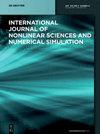Impacts of heuristic parameters in PSO inverse kinematics solvers
IF 1.5
4区 工程技术
Q2 ENGINEERING, MULTIDISCIPLINARY
International Journal of Nonlinear Sciences and Numerical Simulation
Pub Date : 2022-05-16
DOI:10.1515/ijnsns-2020-0031
引用次数: 2
Abstract
Abstract In this paper, an investigation is conducted in order to understand impacts of Particle Swarm Optimization (PSO) parameters on the convergence and the quality of the inverse kinematics solutions provided by the IK-PSO (inverse kinematics solver using PSO) – a heuristic inverse kinematics solver algorithm. Over a large panel of parameters investigations, a statistical proof of convergence is provided for 5 links to 60 links articulated system. A recommended set of parameters intervals are presented for this class of IK problems. Investigations are based on the standard inertia weight PSO, and concerned the impact of the inertia weight, the swarm size and the maximum iteration number. For a given set of parameters, the existence of a solution with a given position error is also proved. All tests were conducted over 100 times. The density of probability function, PDF, is used to approximate and analyze the fineness functions, which are the square of the position error. Results showed IK-PSO is an interesting IK solver when a set of good parameters are used. For these parameters, the algorithm showed a statistical proof of convergence with a high resolution, by mean of error position. The algorithm also showed time-effectiveness compared to CCD method, which is assumed to be a real-time IK heuristic solver used in gaming.启发式参数对PSO逆解的影响
摘要在本文中,为了了解粒子群优化(PSO)参数对IK-PSO(使用PSO的逆运动学求解器)(一种启发式逆运动学求解算法)提供的逆运动学解的收敛性和质量的影响,进行了一项研究。在一个大型参数调查小组中,为5个链路到60个链路的铰接系统提供了收敛性的统计证明。为这类IK问题提供了一组推荐的参数间隔。研究基于标准惯性权重粒子群算法,关注惯性权重、群大小和最大迭代次数的影响。对于给定的一组参数,还证明了具有给定位置误差的解的存在性。所有测试都进行了100多次。概率函数密度PDF用于近似和分析精细度函数,精细度函数是位置误差的平方。结果表明,当使用一组好的参数时,IK-PSO是一个有趣的IK解算器。对于这些参数,该算法通过误差位置以高分辨率显示了收敛的统计证明。与CCD方法相比,该算法也显示出了时间有效性,CCD方法被认为是游戏中使用的实时IK启发式求解器。
本文章由计算机程序翻译,如有差异,请以英文原文为准。
求助全文
约1分钟内获得全文
求助全文
来源期刊
CiteScore
2.80
自引率
6.70%
发文量
117
审稿时长
13.7 months
期刊介绍:
The International Journal of Nonlinear Sciences and Numerical Simulation publishes original papers on all subjects relevant to nonlinear sciences and numerical simulation. The journal is directed at Researchers in Nonlinear Sciences, Engineers, and Computational Scientists, Economists, and others, who either study the nature of nonlinear problems or conduct numerical simulations of nonlinear problems.

 求助内容:
求助内容: 应助结果提醒方式:
应助结果提醒方式:


